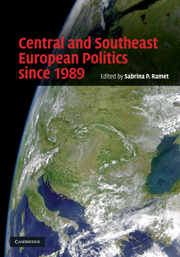Book contents
- Frontmatter
- Contents
- List of figures and maps
- List of tables
- Notes on the contributors
- Preface
- List of acronyms and abbreviations
- Guide to pronunciation of Central and Southeast European words
- 1 Central and Southeastern Europe, 1989
- 2 Central and Southeastern Europe, 2009
- Part 1 Introduction
- Part 2 Issues
- Part 3 Central Europe
- Part 4 Yugoslav Successor States
- 11 Slovenia since 1989
- 12 Politics in Croatia since 1990
- 13 Serbia and Montenegro since 1989
- 14 Bosnia and Herzegovina since 1990
- 15 Macedonia since 1989
- 16 Kosova: resisting expulsion and striving for independence
- Part 5 Southeastern Europe
- Part 6 Former Soviet republics
- Part 7 Present and future challenges
- Index
- References
14 - Bosnia and Herzegovina since 1990
Published online by Cambridge University Press: 05 June 2012
- Frontmatter
- Contents
- List of figures and maps
- List of tables
- Notes on the contributors
- Preface
- List of acronyms and abbreviations
- Guide to pronunciation of Central and Southeast European words
- 1 Central and Southeastern Europe, 1989
- 2 Central and Southeastern Europe, 2009
- Part 1 Introduction
- Part 2 Issues
- Part 3 Central Europe
- Part 4 Yugoslav Successor States
- 11 Slovenia since 1989
- 12 Politics in Croatia since 1990
- 13 Serbia and Montenegro since 1989
- 14 Bosnia and Herzegovina since 1990
- 15 Macedonia since 1989
- 16 Kosova: resisting expulsion and striving for independence
- Part 5 Southeastern Europe
- Part 6 Former Soviet republics
- Part 7 Present and future challenges
- Index
- References
Summary
Bosnia and Herzegovina (hereafter, Bosnia) only reluctantly became an independent country as Yugoslavia dissolved in 1991–2. Bosnia emerged the most weakened of all states from the wars over Yugoslavia's dissolution. Not only was it physically destroyed, around 100,000 Bosnian citizens were dead and half of the population displaced, but also a third of the population which identified as Serbs and many Croats (less than a fifth of the population) had little commitment to the state and saw their future in neighboring Serbia and Croatia. Bosnia survived only as a weak state which gave predominance to ethnoterritorial units carved out during the war through ethnic cleansing and mass murder. In order to survive the immediate post-war period, Bosnia could only exist with limited sovereignty and a strong international presence. Thus the post-communist period in Bosnia was overshadowed by the aftermath of the war and debates were unlike those in most other countries in Central and Eastern Europe. Ethnicity often took precedence over democratization, fragmentation over economic reform, and international imposition over domestic state-building.
This chapter on the deeply divided Bosnian polity will first explore the aborted democratization process before the war and the impact of the war itself. It will then turn to the political system and the development of the country's party system. Subsequently, it will discuss the nature and impact of EU integration processes and economic liberalization.
- Type
- Chapter
- Information
- Central and Southeast European Politics since 1989 , pp. 311 - 327Publisher: Cambridge University PressPrint publication year: 2010
References
- 3
- Cited by



